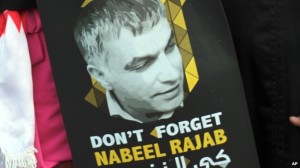MANAMA, Bahrain- Human rights activist and president of the Bahrain Center for Human Rights, Nabeel Rajab, was released from prison on Saturday after serving two years for organizing and taking part in illegal protests that were considered “anti-government.”

In addition to holding the presidency of the Bahrain Center for Human Rights, Rajab is Deputy Secretary General of the International Federation for Human Rights.
Rajab is a key Shiite activist for the protest movement against the Gulf Arab monarchy’s Sunni rulers. Since 2011, the Shiites have been protesting, demanding greater rights and political freedoms for their people
Since mid-February 2011, thousands of anti-regime protestors have held numerous peaceful demonstrations in the streets of Bahrain, calling for the government to relinquish power. Hundreds of citizens have been killed and even more injured and arrested in the government’s ongoing crackdown of these peaceful demonstrations.
Before his imprisonment, Rajab was repeatedly detained in connection with “pro-democracy” demonstrations that erupted in the Gulf. Rajab claimed he was punched in the face several times by riot police after leading these demonstrations. He also stated he was held in dire conditions and subjected to cruel treatment, including being placed in solitary confinement with dead animals and being held almost naked.
Rajab was sentenced, in early 2012, to three years in prison, but an appeals court later reduced his term by one year.
In mid-2012, Rajab was given an additional three months in prison for his comments on Twitter about Bahrain’s prime minister. This conviction was later overturned in an appeals court.
While in prison human rights groups, including Amnesty International and Human Rights First, campaigned for his release, calling on authorities for an early release.
After his release, Rajab told the Associated Press that he is “happy to be out [of prison} after more than 600 days.” Rajab called for the release of all political prisoners and said that stability can only be achieved “through respect for human rights.”
“After two years in prison, I see Bahrain’s political environment as more difficult than ever and still without a roadmap for real reforms,” Rajab said. “I am happy to be with my friends and back with the human rights community, but still saddened that there are thousands of others who are still behind bars or outside the country.”
Maryam al-Khawaja, the acting president of the Bahrain Center for Human Rights while Rajab was in prison, said that “even though Rajab was released from prison, citizens should note that this is not a show of goodwill on the government’s part as Rajab was not pardoned or released early, but completed his full term.”
After his release from prison, Rajab was greeted by dozens of people outside the prison and hundreds of people gathered near Rajab’s house to welcome his release.
Rajab said that Bahrain’s situation today is worse compared to when he went to prison because of an upsurge in violence. Bahrain said that although he was imprisoned he will not stop participating in peaceful demonstrations, but denounces violence.
For more information see:
PressTV- Nabeel Rajab urges “serious dialogue” in Bahrain– 25 May 2014
BBC News- Bahrain activist Nabeel Rajab released from prison– 24 May 2014
Watertown Public Opinion- Top Bahrain activist released from prison– 24 May 2014
Al Jazeera- Bahrain frees leading human rights activist– 25 May 2014


